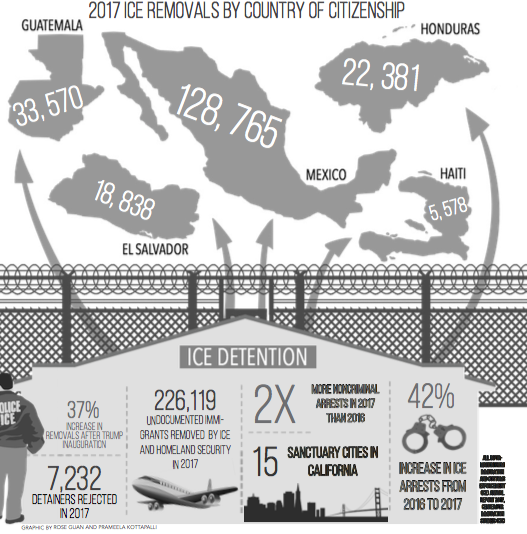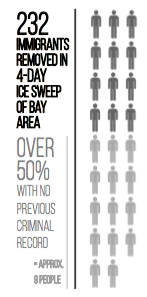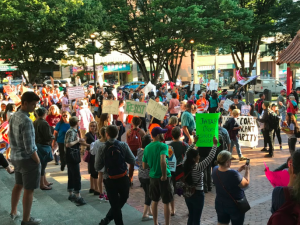Pulse of the People: ICE raids sweep immigrant communities
Oakland Mayor Libby Schaaf warned city residents of upcoming ICE raids in the Bay Area and presented an option of legal representation to undocumented immigrants through Twitter on Feb. 27. Three days after her initial admonition, Schaaf defended her actions tweeting: “I do not regret sharing this information. It is Oakland’s legal right to be a sanctuary city and we have not broken any laws. We believe our community is safer when families stay together.”

March 31, 2018
Immigration is one amongst many policies, like marijuana legalization, climate change, and offshore drilling, upon which California politicians and the Trump administration disagree.
Shane Patrick Connolly, the vice chair of the Santa Clara County Republican party, disapproved of Shaaf’s actions as it may allow undocumented immigrants with a history of violent crime to escape law enforcement.
“By announcing when ICE is coming, she gave a heads up for the worst people in the community who have committed serious crimes and had convictions to hide out until the agents had gone, so I think it sends a really bad message to the community since she put both ICE agents and those in her city at risk,” Connolly said.
The Supreme Court recently ruled that undocumented immigrants can legally be detained indefinitely, and numbers of those arrested during ICE raids is rapidly increasing. In a massive four-day immigration sweep, over 230 residents were arrested in Northern California alone. Though they were offered legal help, the majority of those arrested could not afford it and are facing immediate deportation.
Over half of those arrested and subsequently deported possessed criminal records, while the other half had no previous criminal activity.
Oakland is one of the many cities taking a stand against immigration laws they deem unfair and protecting undocumented citizens without a history of violent crime from deportation. The municipalities–known as ‘sanctuary’ cities–prohibit police from detaining individuals based solely on their immigration status or inquiring about to their immigration status.
With the rising movement against deportation and those advocating for the rights of immigrants, the opposite side of the argument is experiencing growing feelings of tension and negative feelings towards those who came here illegally.
“I think we’re seeing an uptick in xenophobia because there has been a growing insecurity amongst some segments of the United States. Whether or not that insecurity is warranted or not, their feeling of insecurity is real. People respond to that in different ways, and unfortunately, several portions of the United States have chosen immigration as a scapegoat. I don’t mean to say that immigration hasn’t affected the economic realities, which affect a segment of the population, but I don’t think it has affected them to the degree they think it has or that they are being told it has” Stevens said.
In response to the Mayor’s tweet, White House press secretary Sarah Huckabee Sanders criticized Schaaf for allegedly endangering the lives of immigration enforcement officers.
“I think it’s outrageous that a mayor would circumvent federal authorities and certainly put them in danger by making a move such as that,” Sanders tweeted Thursday, Feb. 28. “And that’s currently under review by the Department of Justice.”
This exchange highlights the differing stances of California politicians and those in the Trump administration on immigration. Among many other policies, the two sides have also disagreed in the past on subjects such as marijuana legalization, climate change and offshore drilling.
Shane Patrick Connolly, the vice chair of the Santa Clara County Republican party, disapproved of Shaaf’s actions as it may have allowed undocumented immigrants with a history of violent crime to escape law enforcement.
“By announcing when ICE is coming, she gave a heads up for the worst people in the community who have committed serious crimes and had convictions to hide out until the agents had gone, so I think it sends a really bad message to the community since she put both ICE agents and those in her city at risk,” Connolly said.
Due to a recent ruling by the Supreme Court, it has been determined that undocumented immigrants can legally be detained indefinitely. The numbers of those arrested during ICE raids is rapidly increasing. In a massive four-day immigration sweep, over 230 residents were arrested in Northern California alone. Though they were offered legal help, the majority of those arrested could not afford it and are facing immediate deportation.
Oakland is one of the many cities across the United States taking a stand against immigration laws they deem unfair and protecting undocumented citizens without a history of violent crime from deportation. The cities prohibit police from detaining individuals based solely on their immigration status or inquiring about to their immigration status. Attorney General Jeff Sessions and President Trump have threatened to defund sanctuary cities and states if they do not comply with federal immigration laws many times in the past.
Connolly, on the other hand, believes that a lack of communication between sanctuary cities and federal law enforcement could put undocumented citizens who have not committed serious crimes at risk.
“When there is some level of cooperation between the local government and the federal government, they can target the folks for removal from the community that would cause harm, but when there is no communication, the ICE agents do sweeps that are more likely to pick up [undocumented immigrants] that have not committed serious crimes,” Connolly said. “So in my opinion, it is better [for sanctuary cities] to work with federal employees so that dangerous people can be removed in a way without harming everyone else.”
Over half of those arrested and subsequently deported possessed criminal records. This has been a key argument brought up by Republicans many times in the past to defend strict immigration enforcement. President Trump for example cited the death of Kate Steinle, after being shot by an undocumented immigrant whom had been deported five times but allowed to stay due to sanctuary laws, as a prime instance of tougher immigration laws being needed.
To protect the entirety of California, lawmakers passed Senate Bill 54, which ensures that no state or local resources are allowed to engage in mass deportations and that schools, hospitals, and courthouses are safe spaces in which no arrests can be made.
Though the legislation was called “unconscionable” by U.S. Attorney General Jeff Sessions, California Governor Jerry Brown quickly took action on signing the measure into action.
The government as well as its staff have recently been cast into turmoil over false claims made by the Trump administration, as California ICE Spokesman James Schwab resigned on March 13.
Schwab quit following claims from President Trump and Jeff Sessions that Schaaf was the sole reason hundreds of people had escaped arrest. In his resignation, Schwab cited statistics of the ICE raids previous success rates, showing that out of the 1000 immigrants targeted, the raids usually reach a third of their goal.
The other half of the population of undocumented immigrants have strong ethics and are hardworking. Over 72 percent, around 7 million undocumented immigrants, are currently employed, according to the Washington Examiner. With the rising movement against deportation and those advocating for the rights of immigrants, the opposite side of the argument is experiencing growing feelings of tension and negative feelings towards those who came here illegally.
“I think we’re seeing an uptick in xenophobia because there has been a growing insecurity amongst some segments of the United States. Whether or not that insecurity is warranted or not, their feeling of insecurity is real. People respond to that in different ways, and unfortunately, several portions of the United States have chosen immigration as a scapegoat. I don’t mean to say that immigration hasn’t affected the economic realities, which affect a segment of the population, but I don’t think it has affected them to the degree they think it has or that they are being told it has” Stevens said.
This piece was originally published in the pages of The Winged Post on March 30, 2018.


















![“[Building nerf blasters] became this outlet of creativity for me that hasn't been matched by anything else. The process [of] making a build complete to your desire is such a painstakingly difficult process, but I've had to learn from [the skills needed from] soldering to proper painting. There's so many different options for everything, if you think about it, it exists. The best part is [that] if it doesn't exist, you can build it yourself," Ishaan Parate said.](https://harkeraquila.com/wp-content/uploads/2022/08/DSC_8149-900x604.jpg)




![“When I came into high school, I was ready to be a follower. But DECA was a game changer for me. It helped me overcome my fear of public speaking, and it's played such a major role in who I've become today. To be able to successfully lead a chapter of 150 students, an officer team and be one of the upperclassmen I once really admired is something I'm [really] proud of,” Anvitha Tummala ('21) said.](https://harkeraquila.com/wp-content/uploads/2021/07/Screen-Shot-2021-07-25-at-9.50.05-AM-900x594.png)







![“I think getting up in the morning and having a sense of purpose [is exciting]. I think without a certain amount of drive, life is kind of obsolete and mundane, and I think having that every single day is what makes each day unique and kind of makes life exciting,” Neymika Jain (12) said.](https://harkeraquila.com/wp-content/uploads/2017/06/Screen-Shot-2017-06-03-at-4.54.16-PM.png)








![“My slogan is ‘slow feet, don’t eat, and I’m hungry.’ You need to run fast to get where you are–you aren't going to get those championships if you aren't fast,” Angel Cervantes (12) said. “I want to do well in school on my tests and in track and win championships for my team. I live by that, [and] I can do that anywhere: in the classroom or on the field.”](https://harkeraquila.com/wp-content/uploads/2018/06/DSC5146-900x601.jpg)
![“[Volleyball has] taught me how to fall correctly, and another thing it taught is that you don’t have to be the best at something to be good at it. If you just hit the ball in a smart way, then it still scores points and you’re good at it. You could be a background player and still make a much bigger impact on the team than you would think,” Anya Gert (’20) said.](https://harkeraquila.com/wp-content/uploads/2020/06/AnnaGert_JinTuan_HoHPhotoEdited-600x900.jpeg)

![“I'm not nearly there yet, but [my confidence has] definitely been getting better since I was pretty shy and timid coming into Harker my freshman year. I know that there's a lot of people that are really confident in what they do, and I really admire them. Everyone's so driven and that has really pushed me to kind of try to find my own place in high school and be more confident,” Alyssa Huang (’20) said.](https://harkeraquila.com/wp-content/uploads/2020/06/AlyssaHuang_EmilyChen_HoHPhoto-900x749.jpeg)













